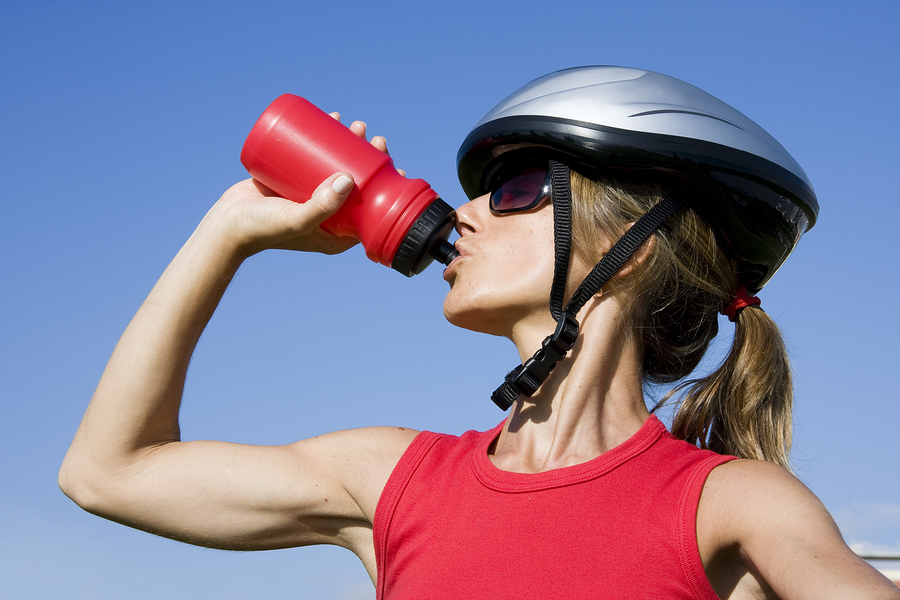Have you ever experienced sudden cramping or weakness in your muscles during strenuous activity?
Do you tend to get skin rashes or “dry mouth” during intense exercise? 
These are signs of electrolyte depletion. Contrary to popular belief , it is not just a condition that affects marathoners and triathletes. Even the “weekend warrior” or recreational athlete can find himself hitting the wall or bonking out without warning.
So what causes electrolyte depletion? Well, it’s typically the result of improper nutrition or hydration prior to a physically demanding activity and/or failure to replenish essential nutrients (electrolytes) during the activity.
What are these electrolytes and why do we need them?
“Electrolyte” is a scientific term for salts. These electrically charged ions are responsible for carrying electrical impulses across the cell membranes in your nerves and muscles, including your heart, and managing the pH of your blood. Your kidneys and adrenal glands are responsible for keeping electrolyte levels in your blood in the proper balance. However, when you exercise heavily you lose electrolytes through your sweat, especially sodium and potassium. Other electrolytes are calcium, magnesium, chloride, and bicarbonate. Other factors that can contribute to electrolyte depletion are malnutrition, thyroid imbalances, the use of certain medications (such as diuretics and hypertension drugs), excessive vomiting and diarrhea. So as you can see, without sufficient electrolytes, your performance and, more importantly, your health may be compromised to say the least.
Besides profuse sweating, other factors that can contribute to electrolyte depletion are malnutrition, thyroid imbalances, the use of certian medications (such as diuretics and hypertension drugs), excessive vomiting and diarrhea. Drinking too much distilled water can also deplete these essential minerals.
How do you ensure that you have adequate electrolytes? Firstly and most importantly, eat a balanced, nutrient-dense diet consisting of plenty of green leafy vegetables, eggs, lean meats and fish, whole grains and legumes, raw nuts and seeds. But even if you do eat all the right foods, if you are engaging in intense exercise or otherwise plan to sweat a lot, I recommend supplementing with a good electrolyte formula prior to an during that activity. The challenge is the electrolyte supplement market has become flooded with countless “sports beverages” that are high in sugar and laden with additives and preservatives. These are essentially glorified soft drinks. I will call out a few of them here.
Gatorade and Powerade are the market leaders and also happen to be two of the worst of the bunch. They are manufactured by PepsiCo and Coca-Cola, respectively, and are full of artificial flavors and colors as well as denatured oils such as brominated vegetable oils (a flame retardant and known toxin) and plenty of refined sugars and artificial sweeteners. I know plenty of professional and collegiate athletes still use this stuff, but I also know they could do better. Vitaminwater (also made by Coca-Cola), besides having the most deceptive name, is loaded with 32 grams of sugar and synthetic vitamins—most of which your body can’t absorb. Then there are Accelerade, which contains GMO soy protein and plenty of fructose, and Cytomax, which is sweetened with GMO corn derivatives and contains artificial flavors.
The closest things to a decent electrolyte formula are Emergen-C Lite and raw coconut water. The former is an effective and relatively harmless choice. It actually contains bonus nutrients like vitamin B6 for enhanced absorption and vitamin C and alpha lipoic acid for extra antioxidant protection.
The coconut water is tricky because although natural coconut water—I’m talkin right out of the coconut—is chocked full of natural sugars and essential nutrients, including electrolytes, it typcially goes through a fair amount of processing before it is boxed up and consumed by you. Unfortunately, many of these wonderful nutrients are lost in the processing. An notable exception is the raw coconut water, which is considerably more expensive, but contains all of the electrolytes you would need and more.
So if you are looking for more economical alternatives, I recommend making your own. Here are five different recipes you might try out. Please note that wherever it says water, I recommend spring or filtered water as opposed to tap or distilled water. In fact, it is ideal to use an electrolyte enhanced water, such as Essentia or a generic brand. When you see sea salt in the recipe, I recommend using Himalayan or Celtic sea salts because they contain trace minerals that makes the water more easily absorbed by the cells.
Quick and Simple
2 Quarts Pure water (spring, filtered or distilled)
¾ Cup Fresh lemon juice
¼- ½ tsp Natural sea salt (ideally Himalayan or Celtic Salt)
¼ Cup Natural sweetener (honey, maple syrup, sorghum)
The Lip Twister – Tart and Sweet
¼ Cup Fresh lemon juice
¼ Cup Fresh lime juice
1 tsp Natural sea salt
1 whole Squeezed orange (or one frozen can orange juice)
1 Liter Water
Mix it Up – Use a Blender
2 Bananas
3 Cups Coconut water or 2 Cups Strawberries or watermelon
1 Cup water and ice
1 tsp Natural sea salt
Juice of ½ Lemon
Power Punch
1 quart water
¼ tsp natural sea salt
½ tsp mixed ascorbate (vit. C) powder
¼ cup juice (lemon, lime, watermelon, or orange)
½-1 tsp stevia
On the Go
2 Cups Coconut water
½ tsp Natural sea salt
½ tsp Stevia or honey
1 quart water
